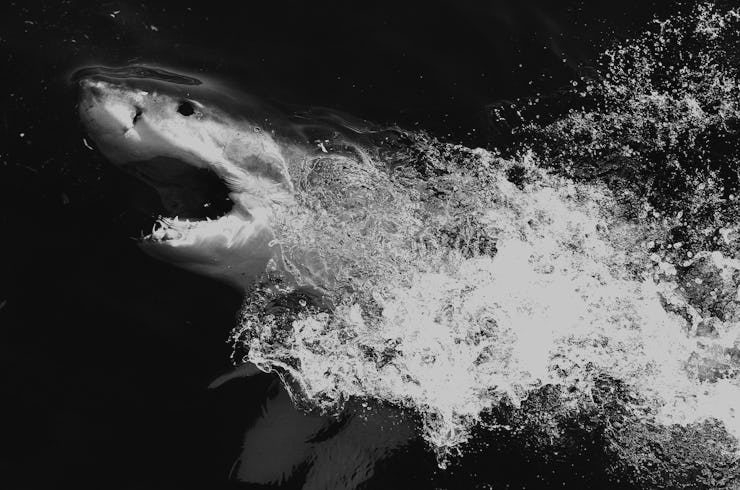The Attacks That Inspired Our Fear of Sharks 100 Years Ago
Four deaths in 12 days sparked a media feeding frenzy.

On July 1, 1916, a young man was attacked and killed by a shark while swimming off the Jersey Shore. By July 12, there were an additional four attacks, including three deaths. It was a shocking sequence of events in a part of the world that had had no previously documented shark bites.
One hundred years ago this month, America’s deep fascination — and deeper fear — of the ocean’s greatest predator was set off. The events spurred a media and popular cultural tradition that birthed Jaws, Shark Week, and more, all the way up to this summer’s surprise hit, The Shallows. Before 1916, people mostly considered sharks pretty benign, and certainly not hunters of humans.
While this makes for a tidy narrative, the truth, as usual, is more complicated. “The fact is, is that sharks were biting humans long before 1916, and they’ve continued to bite since,” George Burgess, program director with the Florida Program for Shark Research, tells Inverse.
In truth, human fear of sharks was alive and well long before the Jersey Shore attacks. Burgess says there was a scientific and public debate, then as now, as to whether or not sharks deserved their nasty reputation. In 1891, a wealthy banker named Hermann Oelrichs put $500 on the line to the person who could provide verifiable proof of a shark attack north of Cape Hatteras, North Carolina. The thought was that sharks — and their bites — were contained to warmer waters, and the rest were just fish stories.
No one claimed the prize.
Michael Schleisser and a great white shark captured in Raritan Bay, suspected to be the culprit of the Jersey Shore shark attacks of 1916.
What changed in 1916 is not that the public went from seeing sharks as harmless to seeing them as monsters, but that we went from holding an unjustified terror to a somewhat justified one.
And that geographic distinction, of north and south, is an important one. “At that time, the New Jersey coastline was sort of the summer place to be, if you were anybody,” says Burgess. “And so that’s where the fat cats went to spend their summer, to have their beach houses and their parties and so forth.” The events of that summer shocked the public imagination and created a media feeding frenzy because of where they happened, and who was impacted by them. It turns out shark attacks aren’t great for business.
An eerily similar set of incidences played out last summer, where a series of shark attacks off the coast of North Carolina received a great deal of attention. In interviews, Burgess says he discovered that many of the journalists covering the story also vacation on the Outer Banks. Access to the ocean is still a matter of privilege, and the privileged still have a greater say on what issues are worthy of attention. “A little bit of a class situation was still in effect, here, almost 100 years later,” he points out.
Our understanding of sharks has progressed by a century, but much remains the same, says Burgess. Then as now, you have scientists saying that sharks are not out to get humans, that when attacks occur, it’s because we’ve been mistaken for lunch. Then as now, our fear of sharks is greatly outsized to the risk they actually pose to us.
Shark attacks on SCUBA divers are exceedingly rare.
The truth is that there are just six deaths by shark attack on average each year. “When you consider the literally billions of hours and the hundreds of millions of people that enter the sea every year — to only have six of us go in and not come out as a result of sharks is pretty damn amazing,” says Burgess. “If we make a list of the dangers associated with aquatic recreation, shark bites and certainly shark death would be right near the bottom of the list.”
Meanwhile, humans kill between 30 million and 100 million sharks every year, says Burgess. Some of those are killed in shark control programs that specifically aim to reduce attacks, including one in Australia that takes 200-300 tiger sharks each year, including recently a tagged shark named Maroochy. “We’re killing a hell of a lot more of them than they are of us,” he says.
“We’re basically haughty. We’re so used to getting our way — we can put dams over great rivers, we can put big bridges over gorges or bays, we blow up sides of mountains, we can dig big holes into the Earth, we can sail from here to there, we can fly from here to there, we can do all of these kinds of things,” says Burgess. “The thought that there’s something out there that we don’t control, I suspect, is offensive to the psyche of a lot of people, and unfortunately as a result of that, we still see in some quarters, people that will argue that sharks serve no purpose, and that if a shark attack occurs, we should be out there killing them.”
If we choose to enter the sea, then we choose to enter a wilderness, and we must accept that there are risks we cannot control, he says. “That sea doesn’t owe us the right of 100 percent safety — we’re visitors to it, we’re eco-tourists.”